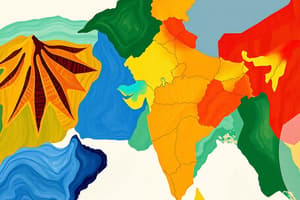Podcast
Questions and Answers
What are some of the areas of focus for physical geographers as mentioned in the text?
What are some of the areas of focus for physical geographers as mentioned in the text?
- Literature and art history
- Coral reef growth and desertification (correct)
- Astronomy and chemistry
- Economics and political science
Which field is NOT mentioned as being part of interdisciplinary analyses involving physical geography?
Which field is NOT mentioned as being part of interdisciplinary analyses involving physical geography?
- Chemistry (correct)
- Meteorology
- Landscape architecture
- Hydrology
What collaboration mentioned in the text expands possibilities for illuminating geophysical relationships?
What collaboration mentioned in the text expands possibilities for illuminating geophysical relationships?
- Collaboration with psychologists
- Collaboration with GIS analysts (correct)
- Collaboration with historians
- Collaboration with economists
How might research assistants in physical geography shape policy decisions according to the text?
How might research assistants in physical geography shape policy decisions according to the text?
What do some physical geographers study in the context of mass movements and volcanism?
What do some physical geographers study in the context of mass movements and volcanism?
What does physical geography primarily study?
What does physical geography primarily study?
Why is it important to study climatic cycles in physical geography?
Why is it important to study climatic cycles in physical geography?
What valuable insights can be gained from studying the role of rivers in physical geography?
What valuable insights can be gained from studying the role of rivers in physical geography?
In physical geography, what is the significance of understanding coastal currents?
In physical geography, what is the significance of understanding coastal currents?
How do physical geographers use their knowledge of Earth's surface changes?
How do physical geographers use their knowledge of Earth's surface changes?
What type of phenomena might geographical researchers measure in physical geography studies?
What type of phenomena might geographical researchers measure in physical geography studies?
Flashcards are hidden until you start studying
Study Notes
Unlocking Physical Geography's Secrets
Physical geography delves into the Earth's dynamic landforms and landscapes, its atmospheric patterns, water systems, and ecological processes. This fascinating branch of geographic science paints a vivid tapestry of our planet, revealing meaningful connections between nature and humanity.
As students of physical geography, we learn about features such as mountain ranges, river valleys, coastlines, oceans, and climate zones, among countless others. Through these lenses, we observe weather patterns, ecosystems, and Earth's surface changes from tectonic shifts to glaciations. By studying these phenomena, we acquire valuable insights into global interactions and challenges.
For example, understanding the role rivers play in eroding and depositing sediments offers critical lessons regarding flood management and sustainable river engineering. Similarly, learning about coastal currents helps us predict the behavior of storm surges, which safeguards vulnerable shoreline habitats. Moreover, tracking climatic cycles allows us to anticipate and adapt to changing environments, ensuring resilience in face of climate variations.
The work of geographical researchers encompasses diverse aspects of physical geography. For instance, they might measure the temperature distribution associated with El Niño events or track the movement of sand dunes. Some physical geographers focus on documenting the growth of coral reefs or examining the factors contributing to desertification. Others study mass movements, volcanism, glaciology, permafrost dynamics or seafloor topography.
These pursuits often complement interdisciplinary analyses involving fields like hydrology, oceanography, meteorology, soil sciences, ecosystems, and landscape architecture. Furthermore, collaboration with experts like GIS analysts expands possibilities for illuminating geophysical relationships through powerful modeling techniques.
Whether propelled by intellectual curiosity or dedicated to shaping the future, research assistants in physical geography contribute immensely to the collective pursuit of knowledge. Their expertise shapes policy decisions, steering environmental planning, resource allocation, disaster response, pollution control, and conservation efforts worldwide.
Studying That Suits You
Use AI to generate personalized quizzes and flashcards to suit your learning preferences.




